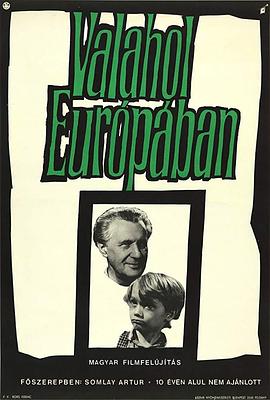简介
Somewhere in the remote region, the war ends. In the midst of ruined cities and houses in the streets, in rural hamlets, everywhere where people still live, are children who have lost their homes and parents. Abandoned, hungry, and in rags, defenseless and humiliated, they wander through the world. Hunger drives them. Little streams of orphans merge into a river which rushes forward and submerges everything in its path. The children do not know any feeling; they know only the world of their enemies. They fight, steal, struggle for a mouthful of food, and violence is merely a means to get it. A gang led by Cahoun finds a refuge in an abandoned castle and encounters an old composer who has voluntarily retired into solitude from a world of hatred, treason, and crime. How can they find a common ground, how can they become mutual friends The castle becomes their hiding place but possibly it will also be their first home which they may organize and must defend. But even for this, the price will be very high. To this simple story, the journalist, writer, poet, scriptwriter, movie director, and film theoretician Béla Balázs applied many years of experience. He and the director Géza Radványi created a work which opened a new postwar chapter in Hungarian film. Surprisingly, this film has not lost any of its impact over the years, especially on a profound philosophical level. That is to say, it is not merely a movie about war; it is not important in what location and in what period of time it takes place. It is a story outside of time about the joyless fate of children who pay dearly for the cruel war games of adults. At the time it was premiered, the movie was enthusiastically received by the critics. The main roles were taken by streetwise boys of a children's group who created their roles improvisationally in close contact with a few professional actors, and in the children's acting their own fresh experience of war's turmoil appears to be reflected. At the same time, their performance fits admirably into the mosaic of a very complex movie language. Balázs's influence revealed itself, above all, in the introductory sequences an air raid on an amusement park, seen in a montage of dramatic situations evoking the last spasms of war, where, undoubtedly, we discern the influence of classical Soviet cinematography. Shooting, the boy's escape, the locomotive's wheels, the shadows of soldiers with submachine guns, the sound of a whistle—the images are linked together in abrupt sequences in which varying shots and expressive sharp sounds are emphasized. A perfectly planned screenplay avoided all elements of sentimentality, time-worn stereotypes of wronged children, romanticism and cheap simplification. The authors succeeded in bridging the perilous dramatic abyss of the metamorphosis of a children's community. Their telling of the story (the scene of pillaging, the assault on the castle, etc) independently introduced some neorealist elements which, at that time, were being propagated in Italy by De Sica, Rossellini, and other film artists. The rebukes of contemporary critics, who called attention to formalism for its own sake have been forgotten. The masterly art of cameraman Barnabás Hegyi gives vitality to the poetic images. His angle shots of the children, his composition of scenes in the castle interior, are a living document of the times, and underline the atmosphere and the characters of the protagonists. The success of the picture was also enhanced by the musical art of composer Dénes Buday who, in tense situations, inserted the theme of the Marseilaise into the movie's structure, as a motive of community unification, as an expression of friendship and the possibility of understanding. Valahol Europaban is the first significant postwar Hungarian film. It originated in a relaxed atmosphere, replete with joy and euphoria, and it includes these elements in order to demonstrate the strength of humanism, tolerance, and friendship. It represents a general condemnation of war anywhere in the world, in any form.
猜你喜欢
-
HD
彩云曲国语
主演:吴少刚,庄静而,刘德华,徐杰,黄造时,雷安娜,汤镇业,艾威,陈庭威,庄文清,林伟健 -
HD
狂兽国语
主演:张晋,余文乐,文咏珊,吴樾,林家栋,太保,苏丽珊,曾国祥,苏宸褕,郑紫平,仓田保昭 -
HD
濠江风云国语
主演:任达华,郭可盈,方中信,郑则仕,蔡少芬 -
HD
黑白道国语
主演:张家辉,黄秋生,吴镇宇,李彩桦,曾国祥,陈捷文 -
HD
野·良犬国语
主演:陈奕迅,林子祥,曾志伟,林苑,文俊辉,邵音音,张国强,李丽珍,楼南光 -
HD
宝马山奇案
主演:刘少君,林敬刚,李莉莉,谷峰,连晋,吴瑞庭,钟碧颖,嘉玲 -
HD中字
十万火急
主演:西尔维斯特·史泰龙,艾米·布伦尼曼,维果·莫腾森,丹·哈达亚,杰伊·桑德斯,凯伦·杨,克莱尔·布鲁姆,瓦妮莎·贝尔·卡洛威,雷诺里·圣地亚哥,科林·福克斯,丹妮尔·哈丽丝,Trina,McGee,塞奇·史泰龙,乔·安德森,马克·罗斯顿,罗丝玛丽·福赛思,王洛勇,巴瑞·纽曼,斯坦·肖,Mark,Chadwick,李·奥克斯,沙基纳·贾弗里,艾伯特·麦克林,约瑟夫·劳格诺,内斯特·塞拉诺,约翰·利斯,Stephen,James,伊西斯·马森登,罗伯·科恩,帕梅拉·佩林,Dale,Resteghini -
HD中字
武馆
主演:刘家辉,谷峰,惠英红,麦德罗,王龙威 -
HD
可爱的你国语
主演:杨千嬅,古天乐,王诗雅,傅舜盈,陈丽儿,李咏珊,何涴潆,吴耀汉,吴浣仪,姜皓文,刘乔方,狄哲龙,利绵娜,冯淬帆,马浴柯,火火,黄文慧 -
HD
常在你左右国语
主演:古天乐,张智霖,林家栋,蔡卓妍,佘诗曼,林雪,苑琼丹,雨侨 -
HD
散打国语
主演:桑伟淋,赵子龙,倪景阳 -
HD
冲激21国语
主演:张国荣,艾迪,Rowena,Cortes,贾思乐,钟保罗,林迪安,Wai-Hon,Ho,陈志辉,Wah,Cheung,Joseph,Chi,Yi-Hsiung,Chi,钱月笙,Fung,Fung,何柏光,Chia-Hsiang,Hsu,关海山,刘一帆,罗兰,陆应康,米奇,张莽,苏杏璇

